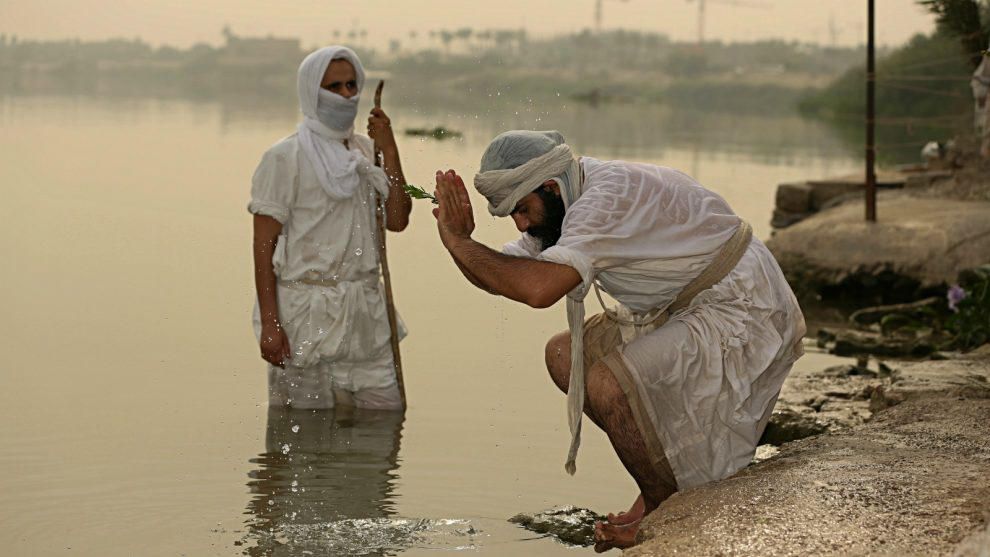
(Mandaean religious communities, who reside in Iraq and throughout the Middle East, follow a Gnostic religion that conducts spiritual practices around bodies of water – In Iraq these rituals are held along the Euphrates and Tigris rivers) – Credit:Hadi Mizban | Credit- AP
Between October and November 2021, Catalystas conducted a gender and conflict-sensitive Stakeholder Mapping, Baseline Study, and Research Study in support of the launch of a transformative and impactful forthcoming program promoting Freedom of Religion and Belief (FoRB) in Iraq. The research, focused through our intersectional feminist approach, was undertaken on behalf of Catalystas’ client Search for Common Ground (Search) who, in consortium with Tearfund, Mensen met een Missie (MM), and local partners Peace and Freedom Organisation (PFO) and other local partners, make up the members of the Joint Initiative for Strategic Religious Action (JISRA) program in Iraq.
The JISRA project, which is currently scheduled for implementation in 7 countries around the world between 2021-2025, specifically aims to:
Our team applied our intersectional feminist approach, coupled with our expertise in post-conflict development and our widespread network in Iraq, to conduct a fast-paced, three-part assessment over November and December 2021. Working with a team of 19 researchers, we set out to achieve the following objectives:

With the project on a very short timeline, our team needed to cover a vast area of work and subject matter in a comprehensive and efficient manner – addressing the over 26 different religious groups and sects identified across the 3 locations of the study. We started by designing our research methodology through a participatory approach, with a goal of ensuring effective transfer of ownership and knowledge to the project’s implementing consortium partners who will ultimately be responsible for all project components over the next 5 years. After our initial inception phase, during which we designed more than 10 unique data collection tools, our team created a self-led training complete with video instruction, handbook, and quiz series to prepare and certify our team of 19 locally based enumerators in our Catalystas Ethical Guidelines for Data Collection: Interviews, Focus Group Discussions, and in-Field Observation Techniques – a training that will be made available to the general public soon!
After selecting, meeting, and training our research team, we set out to map 360 key actors across the target locations; survey 508 respondents (religious actors and general community members) both in-person and through social media channels; undertake 100 key informant interviews (KIIs) with community leaders, religious leaders, and security actors; and conduct 25 Focus Group Discussions (FGDs) consisting of a total of 200 community members, and organized by gender (mixed and separate), age, and religious denomination with an emphasis on conflict and cultural sensitivity.
Our Catalystas team utilized our extensive track record of work in Iraq alongside our experience in conducting remote research to manage the progress of the study, working alongside our trusted local program coordinators and conducting daily rapid data analysis, reviewing raw data, mapping findings, and adjusting our tools and protocols accordingly in real time. This ensured our ability to not only address any in-field challenges immediately, but also to adjust our processes to include newly discovered information, verify and elaborate on particular findings, and collect any additional data needed. Our team went above and beyond simply providing inputs to feed into a global system for monitoring and evaluation; we looked to utilize both quantitative and qualitative information in order to provide a baseline with clear indicators and means of measurement tailored to the Iraqi context, and taking into consideration the complexities of individual and collective identities and behaviors in the dynamic and rapidly shifting security context in each program location. As a result, our team produced a 90-page baseline study and integrated research analysis as a single living document. This expansive report identified and extrapolated into a rich narrative the exceptionally complex dynamics and juxtaposition of religious, political, ethnic, and historical narratives and identities of the local communities, as well as the academic, religious, security, and political actors engaged.

(Our study found that in Iraq, the older generation typically adheres to a strict interpretation of religions according to each particular denomination’s dogma and religious texts)
The final report is currently being translated into Arabic and Kurdish, as a means to transform the findings into easy to use and accessible products. The JISRA-Iraq’s project team will be able to utilize these materials for years to come as they move forward to implement programming that seeks to support tolerance and co-existence when it comes to freedom of religious belief among diverse Iraqi communities.

Catalystas Consulting, Lange Voorhout 43, 2514 EC Den Haag, The Netherlands
© Catalystas Consulting. All rights reserved. Privacy and Policy
An Iranian-American with more than ten years of experience in international relations, economic development, and political empowerment, Beatrice is heavily invested in making the world a better place. Her work spans multiple regions of the world, often including high-risk environments, and her clients include non-governmental organizations, governmental bodies, and small-to-medium–sized corporations throughout the US, EU, Middle East, and Sub-Saharan Africa.
Originally focused on the areas of economic development, security, and disarmament, Beatrice turned to the humanitarian field, where she has expanded her expertise to include international security policy, gender equality, and innovation planning. She is a highly skilled grant writer, program designer, auditor, and capacity and impact assessor, as well as an authority on client and donor relations and ethical corporate engagement strategy.
Her personal and professional interests come together in the use of technology and data to provide solutions and insight into human rights, higher education, sexual reproductive rights, and environmental preservation.
We built Lysta as an answer to one of our own problems: the need to quickly assemble teams of experts across various subject matter, geographic, linguistic, and thematic areas for projects and proposals as they arise. We quickly realized that we were not the only ones facing this challenge! With the speed that development projects require hiring, turnaround, and technical insights, we see first hand how helpful it is to have a ready-made database of vetted experts to call on.
For existing and potential Clients, you can access all consultant full profiles by signing up here as a client for free.
For consultants, adding your profile to Lysta means jumping to the top of the list for our clients in recruitment processes. We do the heavy lifting: the CV reviews, interviews, vetting, and personnel management; so when our clients come to us, they know they’re hiring someone they can trust to deliver high quality, timely results. Click here to add your profile for review.
We’re proud to be a link in the chain that connects the best of the best – don’t hesitate to reach out and see how you can put Lysta to work for you!